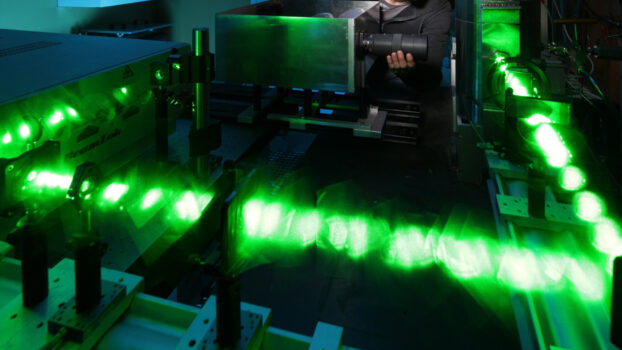Advanced Optical Technologies (MAOT)
Advanced Optical Technologies (MAOT) (M.Sc.)

The Advanced Optical Technologies degree program deals with the latest technologies and innovations in optics and optical technologies. It covers the entire breadth of the application of optical technologies from sensor technology for the automotive industry, to lithography processes for the production of semiconductors, to medical applications. Interested students can also delve further into the fundamentals of physics.
- Degree
- Master of Science
- Duration of studies in semester
- 4
- Start of degree program
- Winter semester
- Study location
- Erlangen
- Number of students
- 1-50
- Subject group
- Engineering sciences
- Special ways to study
- Elite degree programs, International degree program
- Teaching language
- completely in English
- Admission Requirements
- Qualification assessment
- Keywords
- Laser, Light, Optical Technologies, Photonics, physics, Physics
What is the degree program about?
Optical technologies play a key role in a wide variety of technical applications that are essential for future developments in technology and society; optical data transmission – the backbone of the Internet – is just one example. Optical technologies are used in areas such as information and communication technology, medicine, car manufacturing, and energy and environmental technology.
The aim of this Elite degree program, which is taught entirely in English, is to offer excellent students an interdisciplinary Master’s degree program with an international perspective. The MAOT degree program follows on from a Bachelor’s degree in physics or engineering. In the first semester, students are taught the basics of optics with a special emphasis on laser technology. In the second and third semesters, students can choose to specialize in two of four areas: Photonics in Production and Process Technology; Photonic Fibers, Materials and Devicse; Biomedical Photonics and Image Date Processing, Physics of Light.
The degree program combines theoretical knowledge with practical application. The practical relevance of the degree program is increased through collaboration with the Max Planck Institute for the Science of Light, the Bavarian Laser Centre (BLZ), the Fraunhofer Institute IISB and departments at Universitätsklinikum Erlangen.
Links to the Erlangen Graduate School in Advanced Optical Technologies (SAOT) and the Max Planck School of Photonics (MPSP) make it easier for students to go on to complete a doctoral degree.
MAOT is part of the Elite Network of Bavaria (ENB).
-
The Master’s degree program in Advanced Optical Technologies (MAOT) provides in-depth training in the fundamentals and applications of state-of-the-art optical technologies. The program is highly interdisciplinary and brings together experts and knowledge from the fields of engineering, physics, computer science and medicine. Students on our MAOT program benefit from this expertise from across the university in one integrated program, a unique opportunity in the field of optical technologies.
Having previously completed a Bachelor’s degree (or equivalent qualification) in engineering or physics, students are taught the fundamentals of optics and optical technologies and further applications of seven main topics (with two as a major):
- Photonics in Production and Process Technology
- Photonic Fibers, Materials and Devicse
- Biomedical Photonics and Image Date Processing
- Physics of Light
-
- Admission requirements (first semester)
- Qualification assessment
- Application deadline winter semester
-
15.07.
- Content-related admission requirements
-
Students aplly via the FAU application portal Campo and follow the on-screen instructions. The program coordinators evaluate the academic qualification and, if appropriate, invite to an application interview. In case of a positive outcome of the academic evaluation the master office will confirm the formal eglibility and issue the admission letter.
Suitable for students with a Bachelor’s degree in
- Physics
- Engineering (e.g. Electrical Engineering, Mechanical Engineering, Process Engineering, Medical Engineering)
Language skills
- German language skills for international applicants
- No DSH, English (level B2, CEFR)
- Details and notes
-
(recommended for international students: 15 April)
Do you need help or more information?
Our Student Advice and Career Service (IBZ) is the central point of contact for all questions about studying and starting a degree programme. Our Student Service Centres and subject advisors support you in planning your studies.